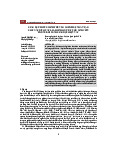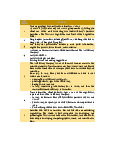














Preview text:
MINISTRY OF EDUCATION & TRAINING HOA SEN UNIVERSITY
FACULTY OF ECONOMICS & BUSINESS ⁃⁃⁃⁃⁃ ⁃⁃⁃⁃⁃ REPORT NEGOTIATION SKILL Topic:
Analyze the most effective negotiation
strategy in business activities of enterprises Group: 2 Class: 1103_2331
Instructor: THANH KHOI, VO- Dr. Business Administration
Tp.HCM, Tháng 10 Năm 2023 LIST OF GROUP MEMBERS No Student Name . ID 1 Lâm Thanh Thảo 22193590 2
Hoàng Thị Hiếu Ngân 22122731 3
Nguyễn Thị Ngọc Ngân 22111741 WORK ASSIGNMENT Perform No Assignm ance Name . ent Appraisa l Analyze Lâm the most 1 Thanh effective 100% Thảo strategie s Introduc tion to Hoàng the topic, 2 Thị Hiếu 100% Topic Ngân overview , Word 3 Nguyễn Reason 100% Thị Ngọc for Ngân choosing 2 | P a g e the topic, Solution, Conclud e, PPT ACKNOWLEDGEMENTS
Along with our deepest gratitude, we would like to express our
sincere thanks as well as the highest gratitude for the contributions of many
people, not just our team members.
First of all, our team would like to sincerely thank lecturer Vo Thanh Khoi
- Lecturer of Hoa Sen University, for following us, wholeheartedly
teaching, helping the group to orient the work, giving us insight.
Specifically. and an overview of the problem that our group has researched and written about.
Thank you to all team members for their efforts, best efforts, solidarity,
enthusiasm, and enthusiasm for this report. Therefore, it is possible to
complete the lesson on time with the full capacity of the group.
The report had many shortcomings because of our limited knowledge and
experience, but our team still managed to complete the essay on time. Hope
you can ignore our shortcomings and gain some of our knowledge through this essay. Thank you very much! 3 | P a g e TABLE OF CONTENTS
ACKNOWLEDGEMENTS..................................................................................1
TABLE OF CONTENTS......................................................................................2 I.
Reason for choosing the topic...................................................................4 II.
Introduction to the topic............................................................................4 2.1.
Topic goal..........................................................................................4
2.1.1. General objective.............................................................................4
2.1.2. Detail objectives..............................................................................4 2.2.
The meaning of the topic...................................................................4 2.3.
Object and scope of the study............................................................4 2.3.1.
Research subjects........................................................................4
2.3.2. Research scope................................................................................4 2.4.
Research Methods.............................................................................5 III.
Content..................................................................................................6 3.1.
Topic overview...........................................................................6
3.1.1. What is negotiation?..............................................................6
3.1.2. Why is it necessary to negotiate?..........................................6
3.1.3. Negotiation strategies in business..........................................7 3.2.
Analyze the most effective negotiation strategy in business activities
of enterprises.........................................................................................8
3.2.1. The importance of an effective negotiation strategy..........8
3.2.2. Effective strategies in distributive negotiation..................8
3.2.3. Reasons to choose the BATNA strategy in negotiations. ..8
3.2.4. Know your BATNA..........................................................9
3.2.5. The benefits that BATNA brings you in negotiations.....11
3.2.6. Case study.......................................................................11 IV.
Conclude.............................................................................................12 4 | P a g e V.
References...............................................................................................13 5 | P a g e
I. Reason for choosing the topic
From time immemorial, the negotiation, discussion to exchange with
each other about something has been formed. Today, it is not uncommon,
from buying and selling goods, studying, etc., especially in business-to-
business or business-to-business. And how to have the best conversation
possible? How to make forum negotiation successful and win-win? There
are tips and strategies to apply to those discussions and in this report we
will clarify this for you along with some relevant information to Negotiation.
II. Introduction to the topic 2.1. Topic goal
2.1.1. General objective
Find out effective negotiation strategies in business and choose the
best one, analyze and offer solutions to improve that strategy for businesses.
2.1.2. Detail objectives
State the definition and concept of negotiation, why do we need to
negotiate and what negotiation strategies are there?
Analyze the negotiation strategy that is said to be the most effective.
Bring out the positives and negatives, and then suggest solutions for that strategy.
2.2. The meaning of the topic
What is negotiation? Why is it necessary to negotiate? Negotiation strategies in business.
2.3. Object and scope of the study 2.3.1. Research subjects International businesses. 2.3.2. Research scope
Overview of issues in negotiation.
Research effective negotiation strategies. 6 | P a g e 2.4. Research Methods
This report is made on the basis of combining with materials obtained
from various sources such as newspapers, magazines, Internet, actual
business negotiations and combined with lectures of lecturers. 7 | P a g e III. Content 3.1. Topic overview 3.1.1. What is negotiation?
Negotiation is a strategic discussion between two parties to resolve
an issue in a way that both find acceptable.
Negotiations can take place between buyers and sellers, employers
and prospective employees, or the governments of two or more countries, among others.
Successful negotiation usually involves compromises on the part of one or all parties. 3.1.2.
Why is it necessary to negotiate?
Conflict Resolution
A dispute or quarrel can lead to damaged relationships, a divided
team and a toxic workplace for everyone. That’s why being able to re-
establish unity through structured, peaceful discussion can be critical to a
business’s ability to flourish.
Building Relationships
Negotiating effectively can give clients, employees and employers a
positive impression rooted in respect. By dealing with problems fairly,
forming strong bonds with clients and securing mutually beneficial deals,
more people will want to work with you because of your ability and value your insights.
Boost the Bottom Line
With well-honed negotiation skills, you’ll be able to walk into any
deal, conversation or networking opportunity and leave with the best
possible outcome for yourself and your company. Communication
Master negotiators aren’t just good talkers, they are excellent
listeners. Everyone, from clients to colleagues, appreciates the person who
takes the time to listen and think before speaking. Problem-Solving 8 | P a g e
Negotiation as a problem-solving tool allows you to openly search for
innovative ways to overcome obstacles when making a deal. Rather than
the conversation shutting down at the first negative response, skilled
negotiators can haggle, discuss and come up with creative solutions. It
creates open-mindedness and shows people you value their time, energy
and service by working hard to find a mutually beneficial agreement. 3.1.3.
Negotiation strategies in business
Distributive Negotiation
Distributive Negotiation refers to a competitive negotiation strategy
which is used when the parties seek to distribute a fixed resource such as
money, assets, etc. between themselves. It is also known as zero-sum, or
win-lose negotiation, in the sense that the parties to negotiation try to claim
the maximum share for themselves and due to which when one party wins
or reaches its goals and the other one loses.
Distributive negotiation is chosen by competitive communicators when
there is lack of mutual trust and cooperation. It is often considered as the best approach to negotiating.
Integrative Negotiation
Integrative Negotiation implies a collaborative negotiation strategy, in
which parties seek a win-win solution to settle the conflict.
In this process, the parties aims and goals are likely to be integrated in such
a way that creates a combined value for both the parties and thus results in
enlarging the pie. It stresses on reaching a mutually beneficial and
acceptable outcome, keeping in mind the interest, needs, concerns, and
preferences of the parties concerned.
The technique is based on the concept of value creation, that yields
substantial gain to each party. In this type of negotiation, two or more
issues are negotiated at a time.
3.2. Analyze the most effective negotiation strategy in business activities of enterprises 3.2.1.
The importance of an effective negotiation strategy
Negotiation strategies that promote a mutual gains approach to the
bargaining table can help you not only achieve a negotiated agreement with
a difficult counterpart but also help a negotiator find ways to create value
and expand the pie of resources. 9 | P a g e 3.2.2.
Effective strategies in distributive negotiation
The most effective key to success in the process of negotiation is to be
prepared. Another important step to be a strategic negotiator is to have an
effective negotiation strategy that convinces the counterpart of the fairness
and adequacy of the negotiator’s wants. The best negotiation strategy
results from understanding the negotiation process and the recognition of
the counterpart’s negotiation strategy. After a detailed self-assessment,
assessment of the other party and of the situation, the strategies which will be involved can be set.
Distributive negotiation is based on hard bargaining, on the early
commitment to position and on the pressure. The negotiators are
competitive, confrontational and antagonistic. Their behavior is
distinguished as egocentric, self-interested, defensive and both sides use a
high degree of assertiveness. The strategies described below rank among
the most widely used and the most effective in the process of distributive negotiation. 3.2.3.
Reasons to choose the BATNA strategy in negotiations
The essential skill before entering negotiation for all negotiators is to
think about their BATNA, BATNA is the standard against which any
proposed agreement should be measured. The negotiators go on to claim
that it is the only standard which can protect them both from accepting
terms that are too unfavorable and from rejecting the terms it would be in
their interest to accept. It is known that not every negotiation ends in an
agreement. The situations when the best solution is to walk away also
appear in the business world. These situations can be recognised according
to the result. If the anticipated result is not better than BATNA, it will be
the best way to walk away from the negotiating table. Successful
negotiation should end up in the result that is better than predetermined
BATNA. The setting of the negotiator’s alternatives is the most
considerable step in the preparation. Negotiators use BATNA to know what
they will do if the agreement is not reached. If they are aware of this fact,
they are more confident during the whole process of negotiation. Thus,
every negotiator should ask yourself before he enters the negotiation:
“What could I do to meet my requirements if I do not reach an agreement?”
In this strategy, it is valid that taking the time to improve and strengthen a
negotiator’s BATNA really guarantees a better result 10 | P a g e 3.2.4. Know your BATNA
BATNA is an acronym that stands for Best Alternative to a Negotiated
Agreement. It is defined as the most advantageous alternative that a
negotiating party can take if negotiations fail and an agreement cannot be
made. In other words, a party’s BATNA is what a party’s alternative is if
negotiations are unsuccessful. This is a method that helps determine the
maximum limit of one side in a negotiation. If you have a good BATNA,
you will have an advantage in negotiations because you can negotiate a
better deal or walk away from the deal if it is not in your favor. Therefore,
BATNA is an important factor in negotiation and helps you achieve the best results in negotiations.
The right time to use BATNA:
If negotiations are fruitless, it is helpful to provide a new perspective on the
issue you are negotiating. This case requires both parties to maintain a
positive and optimistic attitude to be able to come up with the best solution.
Negotiating immediately after helps participants evaluate the ideas they
have generated and determine whether they are among the realistic options.
These alternatives serve as springboards for other ideas, and it becomes
easier for both parties to see what compromise might be in their best
interests. In some cases compromise may not even be necessary but the agreement can still be used.
Before starting a negotiation, the parties need to determine how they can
reach the agreement they want. BATNA should not be used unless
negotiations are taking place or the parties involved are not clear when participating in negotiations. How to determine BATNA:
First, carefully understand both your position and your negotiating
interests. Then, among the possible alternatives, choose the best one.
Besides, do the same from the other person's perspective to determine what
BATNA is to them. Some important factors that need to be considered include:
Costs: Compare the costs of reaching an agreement versus failing
negotiations and use BATNA to map out an appropriate negotiation strategy.
Feasibility: Consider which option is the most feasible and can be replaced promptly among all options. 11 | P a g e
Impact: Consider which option will help you achieve results the fastest or
at least have the earliest positive impact.
Consequences: Identifying the consequences of each option could be a possible solution.
Stakeholders: Do you need to win over any stakeholders before you can move on to your BATNA?
Process for determining a strong BATNA:
Step 1: List all alternatives to the current negotiation. That is, find answers
to the question: "If the negotiation does not take place or fails, what will you and your partner do?"
Step 2: Find out the overlap between the two sides' BATNA ranges
Step 3: Evaluate the value of each alternative solution. That is, what you
and your partner will gain and lose by choosing each alternative.
Step 4: Choose the alternative that brings you the most value (This is your
BATNA in the negotiated agreement).
Step 5: Determine the minimum value you must accept when making an
agreement. Represents the lowest price or value that you are willing to
refuse to negotiate, when the other party demands a lower level.
Step 6: Propose and negotiate within scope to achieve the best agreement. 12 | P a g e 3.2.5.
The benefits that BATNA brings you in negotiations
Easily establish the crux of the issue: Establishing the crux of the issue will
help negotiations go more smoothly and effectively.
Helps you protect yourself: If your partner uses difficult tactics, BATNA
will help protect you from threats, thanks to BATNA you will have a more
objective view of your situation as well. like that of a partner.
Helps you become more confident: Not being able to identify the BATNA
can make your negotiation go unfavorably and uncertainly. This can lead to
wrong decisions. However, with a well-researched and clear BATNA you
will know exactly where you need to go, what you need to do and at the
same time increase your confidence level more than before. 3.2.6. Case study
A generator manufacturing company in the US wants to liquidate an old
production line. The liquidation value of that line is about 600,000 USD
but the company still advertises the price at 1,000,000 USD. During the
negotiation process, there were many companies wanting to buy, two
companies emerged that competed fiercely: a Russian company and a French company.
At that time, the Russians were very interested in this production line and
decided to buy it. So, they agreed to bid 900,000 USD and put down 10%
while the French company only bid 700,000 USD. Therefore, the generator
company decided to refuse the French company's price and agreed to sell to the Russian company. Negotiation analysis:
American company: BATNA sells for 1,000,000 USD
Russian company: BATNA bought for 900,000 USD
=> The two sides accepted the price of 900,000 USD Lessons of success:
The Russian company paid a high price with preferential payment
terms, bringing benefits to lure American partners, causing the American
company to leave its customers. 13 | P a g e IV.Conclude
Under the dedicated and enthusiastic guidance of the teacher during the
past weeks of teaching as well as when he instructed how to make the
report, our group was able to do the project in a way that was not as
difficult as other subjects. other study. Along with the advanced
technologies of today, the team has also obtained and learned from many
documents and knowledge on the Internet from different sources. However,
sometimes the group had conflicts when thinking that they were assigned
too many assignments, or difficult tasks, etc. Finally, the group met and
agreed to complete this report and the group was ready and willing to do
the same. very grateful to receive comments and criticisms from the teacher
as well as other students to be "armed" to prepare for the future. 14 | P a g e V. References
1. Dhir, R. (no date) Negotiation: Definition, stages, skills, and Strategies, Investopedia. Available at:
https://www.investopedia.com/terms/n/negotiation.asp (Accessed: 27 October 2023).
2. S, S. (2017) Difference between distributive negotiation and integrative
negotiation (with comparison chart), Key
Differences. Available at:
https://keydifferences.com/difference-between-distributive-and-integrative-
negotiation.html (Accessed: 27 October 2023).
3. Scotwork (no date) The importance of negotiation in business: Scotwork
global, Scotwork. Available at: https://www.scotwork.com/negotiation-
insights/why-is-negotiation-important-in-business/ (Accessed: 27 October 2023).
4. What is a batna? definition and how to determine batna. Available at:
https://uk.indeed.com/career-advice/career-development/what-is-batna (Accessed: 27 October 2023).
5. Batna: What it means and how to get the most out of negotiations BATNA:
meaning and examples | Santander Scholarships blog. Available at:
https://www.becas-santander.com/en/blog/batna-meaning.html (Accessed: 27 October 2023). 15 | P a g e



